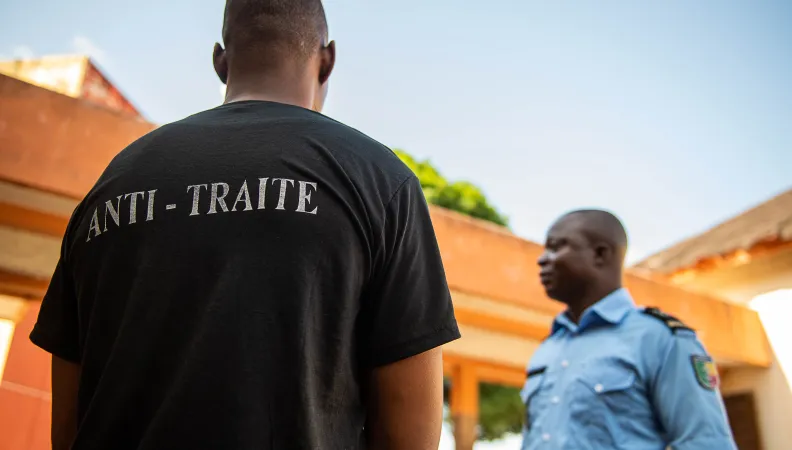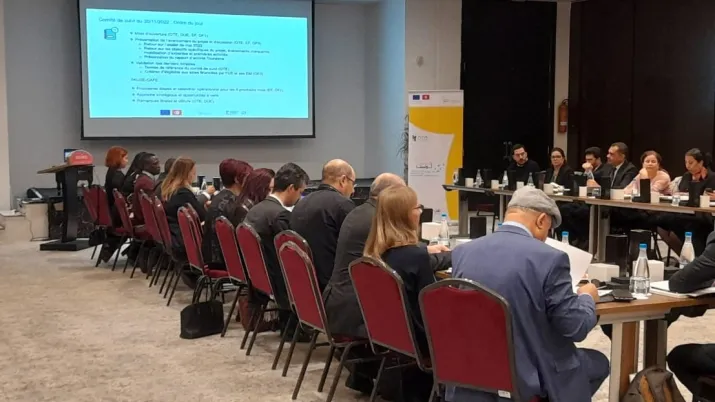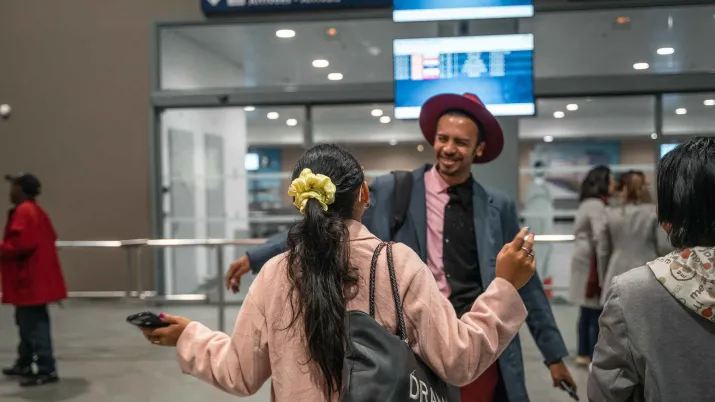Share the page
Migration as a springboard for development - Our work and impact

Migration and international mobility, whether voluntary or forced, is both a challenge and a driver of social and economic development for the countries of origin, transit and destination. This makes it a key issue in French, European and international politics.
As a public body and France’s interministerial development cooperation agency, Expertise France has a long-standing commitment to issues of governance and, in particular, to those of migration and the fight against human trafficking.
We work to strengthen the capacities of our partner countries and organisations. But as we do so, we remain attentive to the advantages of migration for development, the protection of human rights, and the cross-cutting incorporation of gender issues. This helps us promote the effective governance of migration.
To this end, we promote a “triple win” approach to migration, namely one that benefits the migrant, the country of origin, and the host country. As a subsidiary of the Agence Française de Développement (AFD) Group, our projects centre around the Group’s three strategic priorities:
- Invest in development and maximise the positive contributions of migration
- Promote safe, orderly, and regular migration to ensure the respect of the fundamental rights of migrants
- Fight against the root causes of forced migration
281 million of international migrants worldwide in 2020
In 2020, the UN estimated the number of international migrants worldwide to be 281 million, or 3.6% of the global population. This figure has increased three-fold since 1970. Compared to 1990, 128 million more people live outside their country of birth.
Our strategic priorities
Our work takes a transversal approach that strengthens the governance of migration and related public policies. We structure our work around four main areas of action:
- Mobility and circular migration: Promote legal migration channels and aid migrants throughout their migration journey, including the reintegration of returning citizens.
- Combat trafficking and protect migrants: Ensure the protection of migrants and respect for their rights and dignity.
- Return, reintegration and integration: Improve migrants’ access to rights and support the return and economic reintegration of returning citizens.
- Human capital: Capitalise on the benefits of migration for the development of the countries of origin, transit and destination.
“In the Gulf of Guinea, human trafficking is circular and crosses borders: these countries are territories of origin, transit, and destination for trafficking victims.”
- Minister of National Cohesion, Solidarity and the Fight Against Poverty in Côte d’Ivoire

Our framework for action
Our work is aligned with international political and cooperation mechanisms related to migration, including:
- The 2030 Agenda for Sustainable Development Goals (SDGs) to “facilitate orderly, safe, regular and responsible migration and mobility of people, including through the implementation of planned and well-managed migration policies” (SDG 10, Target 10.7).
- The Global Compact for Safe, Orderly and Regular Migration adopted by the international community in December 2018.
- The strategic priorities of the European Union, which include a comprehensive approach to legal migration and mobility; protection and asylum; the prevention of irregular migration, migrant smuggling and human trafficking; returns, readmissions and reintegration; the advantages of migration for development; and addressing the root causes of irregular migration.
- The French 2024-2030 interministerial strategy on migration and development - This strategy reiterates France’s commitment to implementing a comprehensive approach that addresses all aspects of human mobility.
- The AFD Group’s strategy on international migration that highlights the benefits of migration; promotes safe, orderly and regular migration to ensure respect for fundamental rights; and tackles the root causes of forced migration.
- The Valletta Summit on Migration and the five measures of the Joint Valletta Action Plan (JVAP).
- The Cadiz Political Declaration and Action Plan, adopted in December 2022.
- The conclusions of the French Interministerial Committee for International Cooperation and Development and the Presidential Council for Development.
Our services in this area
By supporting and strengthening local capacities, we contribute to the creation of a safer and fairer environment for migrants. Our work allows us not only to share best practices but to strengthen international partnerships and promote a comprehensive and coordinated approach to these complex challenges.
With a clear focus on the needs of our partner countries and organisations, our initiatives adopt an approach that is:
- co-created with a focus on learning, especially peer-to-peer learning, to foster a sense of ownership and ensure the long-term success of the actions implemented
- multi-stakeholder, multi-level and cross-sectoral
- centred around human rights in accordance with France’s 2019 policy paper “Human Rights and Development: A Human Rights-Based Approach to Development Cooperation
Our actions therefore facilitate dialogue between multiple stakeholders; enable the production and sharing of knowledge and data on the challenges facing each sector; strengthen the capacities of institutional stakeholders; support national and regional migration policies and their implementation; and support civil society.
Resources for download
FAQs - For more about migration and human trafficking
Get more information on the link between migration and sustainable development, the different kinds of migration and human trafficking.
When properly supported, international migration is a powerful driver of human, social and economic development for the countries of origin, transit and destination. It contributes to the transfer of skills, the sharing of knowledge, the funding of local projects, and the revitalisation of local areas and regions.
Expertise France is aligned with the AFD Group’s strategy of adopting a “triple win” approach to migration, namely one that benefits migrants, the country of origin and the host country. This approach, which positions migration as a springboard for development, therefore aims to maximise these benefits while protecting the dignity, safety and rights of migrants.
Legal migration refers to any form of international mobility that is legally regulated at a national or international level. It includes, among other things, residency for the purposes of study, work, family reunification or protection.
Circular migration refers to temporary and regular return trips between the countries of origin and destination, particularly for professional, educational or business reasons. This type of mobility promotes the transfer of skills, productive investment, and the integration of talent in both countries.
These forms of migration are at the heart of Expertise France’s actions to strengthen the governance of mobility and promote safe, orderly and beneficial migration channels for all involved.
The Palermo Protocol (2000) defines migrant smuggling as the procurement, for financial or other material benefit, of the illegal entry of a person into a state where that person is not a citizen or a permanent resident.
The UN Protocol Against the Smuggling of Migrants reinforces the United Nations Convention against Transnational Organised Crime. It requires countries to cooperate to prevent smuggling, punish smugglers, strengthen borders without criminalising migrants, and protect migrants’ rights.
Expertise France is actively involved in this area through projects to combat criminal networks, strengthen criminal justice systems, and protect vulnerable migrants.
Human trafficking is a serious violation of fundamental rights. It uses coercion by means of threats, abuse of power, physical harm or psychological harm to force a person into sexual exploitation, forced labour, forced begging, organ harvesting, etc.
Migrant smuggling differs from human trafficking in that it solely facilitates irregular migration in exchange for payment. There is no exploitation of the migrant once they cross the border.
The causes of trafficking are multifaceted. They include poverty, gender inequality, armed conflict, natural disasters, forced migration, and inadequate social and judicial protection systems.
Human traffickers tend to target specific vulnerable populations, such as migrant women, unaccompanied minors, and people from ethnic minorities.
Expertise France adopts a preventative approach that:
- reduces structural causes
- protects fundamental rights
- promotes safe, orderly and regular migration
The fight against human trafficking is part of a long-standing tradition of defending human rights. Important milestones include:
- 1926: Geneva Convention on Slavery
- 2000: Palermo Protocol
- 2005: Council of Europe Convention on Action Against Trafficking in Human Beings
- Since 2010: increasing inclusion of the fight against human trafficking in migration and development strategies such as SDG 8.7, the EU’s Gender Action Plan (GAP) III, and the French strategy on human rights and development
Today, trafficking is recognised as a major social injustice that requires coordinated responses at local, regional, national and international levels. The agency supports this action through programmes that assist victims, support prevention, strengthen the criminal justice system, train stakeholders, and promote inter-institutional cooperation.
Our projects



Key figures 2024
- €102.7 million in multi-year funding agreed in 2024
- 9 projects underway
- 14 countries where we are active
